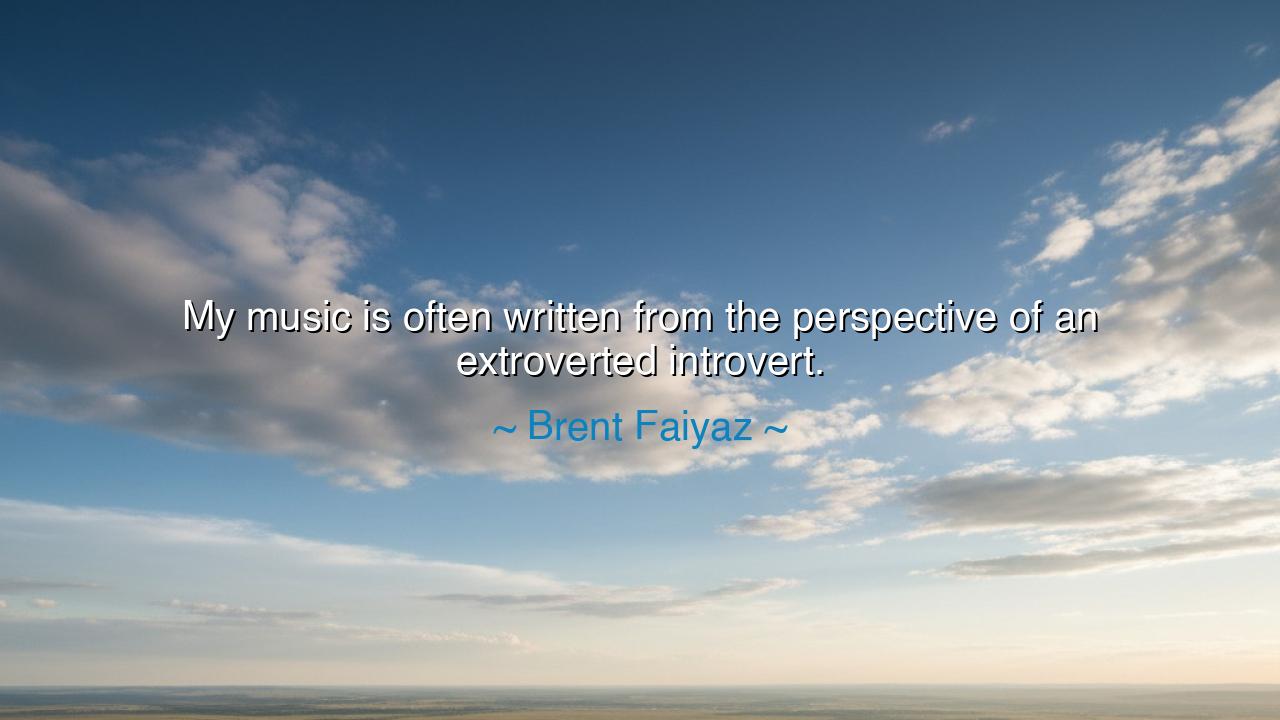
My music is often written from the perspective of an extroverted






Brent Faiyaz speaks with subtle truth when he declares: “My music is often written from the perspective of an extroverted introvert.” At first glance, his words seem a paradox, but in their paradox lies a deeper wisdom. For the soul of man is not simple but layered, a tapestry woven of light and shadow. The introvert holds his world within, gathering silence, reflection, and hidden depths. The extrovert casts his energy outward, shaping the air with voice and presence. To be both is not contradiction—it is balance. And in this balance, Faiyaz shows us how art emerges: as the bridge between the hidden heart and the outward world.
The ancients knew such paradox well. They taught that the wisest ruler was both lion and fox, fierce in presence yet subtle in thought. The warrior in battle was bold in the charge, yet quiet in preparation. So too the artist must hold dual strength: the inward fire of contemplation, and the outward courage to share it. When Faiyaz creates music, he draws first from the introvert’s well—the deep pool of silence, the private corners of the mind where thoughts grow rich. Yet he delivers his words and melodies with the strength of an extrovert, opening his private world to strangers, daring to let others walk the corridors of his soul.
This duality finds echoes in history. Consider Emily Dickinson, the poet who lived much of her life in seclusion. Her verses were born in solitude, shaped by the heart of an introvert. Yet when her words were revealed to the world, they spoke with the force of thunder, touching millions she would never meet. She was, in her own way, an extroverted introvert—her silence gave birth to words that demanded to be heard. The strength of her inner world became the gift that resounded through the outer one.
The power of Faiyaz’s declaration lies in its honesty. Many souls live this same paradox, though few name it. The world often demands the mask of the extrovert, praising loudness, celebration, and constant connection. Yet within, countless hearts ache for quiet, for reflection, for retreat. To live as an extroverted introvert is to honor both needs: to preserve the inner sanctuary, yet also to speak when the spirit must be heard. His music becomes a testimony—that one can dwell in both worlds without being consumed by either.
But there is also struggle in this path. For the introvert’s heart can grow weary of exposure, and the extrovert’s demand can drain the quiet places of peace. The one who lives between both must be vigilant, guarding the balance of soul. Faiyaz, in admitting this, shows courage: he reveals that his art is not only melody, but confession. Each song becomes a negotiation between the voice that longs to hide and the voice that longs to reach.
What then is the lesson for you? That you need not choose one face alone. You may dwell in silence and still have something worth shouting. You may seek solitude and yet return to the crowd with gifts to offer. Embrace your contradictions, for they may be the source of your greatest strength. Do not despise your hidden side, nor fear your revealed one. To be both is not weakness—it is wholeness.
Practical action follows: when you create, or when you speak, let it be born first in stillness. Give your soul time to breathe, to reflect, to gather strength. Then, when the hour comes, step forth boldly and share it without hesitation. Protect your inner garden, but do not let its flowers wither unseen. Water them in solitude, then present them to the sunlit world. In this rhythm lies the path of the extroverted introvert—a life of harmony between the self that retreats and the self that dares.
So, remember Brent Faiyaz’s words not as a riddle, but as a guide. His music, shaped by this paradox, calls us to accept the complexity of our nature. Let your inner silence feed your outer voice, and let your outer voice honor your inner silence. For in this balance, you will find both truth and freedom—and perhaps, like the artist, you too will turn contradiction into song.






AAdministratorAdministrator
Welcome, honored guests. Please leave a comment, we will respond soon